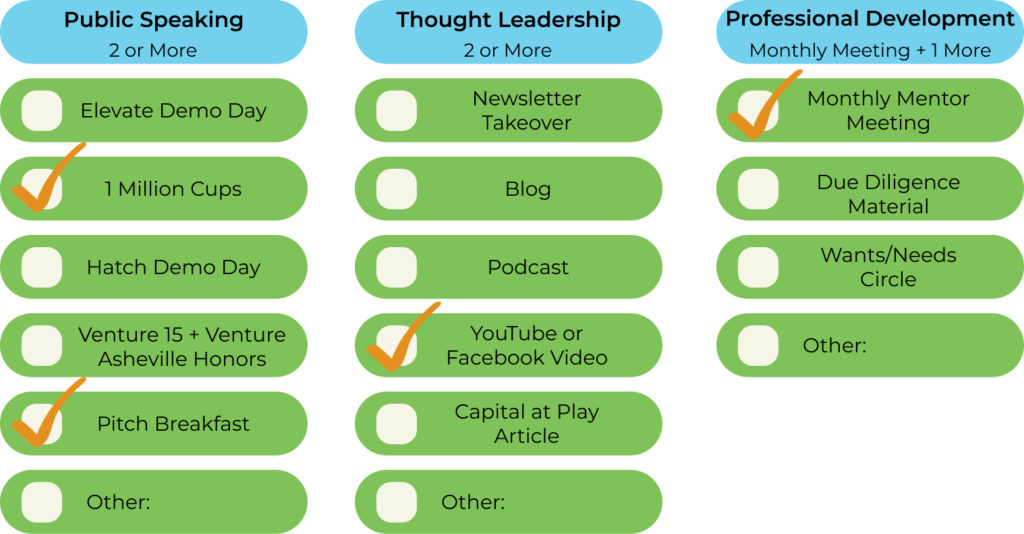Welcome to our series taking a Deep Dive into Venture Asheville. You can find all the posts in this series linked here:
How Venture Asheville Built a $150M Startup Ecosystem; A 7-Part Series
- Setting the Scene for a Small City Startup Hub
- Elevate, a mentorship-based incubator
- The MIT Venture Mentoring System
- Peer Facilitated Mentorship
- TheE13 and Experience Portfolios
- Engaging an Event-Driven Ecosystem
- Looking Beyond the $150M Impact
Venture Asheville uses leading academic and data-backed approaches to building entrepreneurs. This post focuses on TheE13, assessing founders on their Entrepreneurial Competencies, and how we utilize Experience Portfolios.
Entrepreneur Support Organizations (ESOs) must continually prove their efficacy to their stakeholders. The topic of which metrics to use, why they are useful, and how to measure them are a constant source of discussion across entrepreneurial ecosystems and ESO providers. But at the end of the day, all anyone wants to know is, “Are we building better entrepreneurs?”
TheE13 provides a direct and quantifiable metric for entrepreneurs and ESOs. At the individual level, theE13 can show someone where they are strong or weak. For ESOs, they can use theE13 as data tool seeing how their programs, accelerators, or incubators are impacting groups of entrepreneurs. It can also highlight programmatic areas of weakness.
| Thirteen Entrepreneurial Competencies | ||
|---|---|---|
| Opportunity Recognition | Opportunity Assessment | Self-Efficacy |
| Guerilla Skills | Resource Leveraging | Creative Problem-Solving |
| Conveying a Compelling Vision | Value Creation | Risk Mitigation |
| Resilience | Tenacity/Perseverance | Maintain Focus yet Adaptable |
| Building and Leveraging Entrepreneurial Networks |
TheE13 employs the Morris Competency Instrument (MCI), named after its creator, Dr. Michael Morris. The MCI is a peer-reviewed and validated assessment tool to measure an entrepreneur’s mastery of 13 disciplines. Venture Asheville and Montreat College use the MCI in startup mentorship programs and graduate business courses, respectively.
The survey is approximately 100 questions, takes 15-20 minutes to complete, and you get your results immediately. The results of the E13 assessment provide a value between 1 and 5 that assess your personal competency in each of the 13 areas. The higher the number, the greater your competency. The first time you take the E13 your scores represent your baseline competencies. From that point forward, your scores on subsequent tests represent your growth in the 13 entrepreneurial competencies as a result of education, life experiences, and improved self-awareness.
At Venture Asheville, every founder takes theE13 prior to beginning participation in Elevate. This helps staff understand the strengths and weaknesses of the founder, used in consideration for their expert team assignment.
Additionally, when examined as a cohort, and we can get a macro view of the trends within our ecosystem. What we’ve found time and time again, is that entrepreneurs rank lowest in Self-Efficacy and Resilience.
You have to remember, you can’t think your way into entrepreneurship. You have to do the work and as a founder, it’s all on you. Sometimes that leads to analysis paralysis. Founders get overwhelmed. It feeds into this self-doubt, low self-efficacy cycle.
Therefore, we changed Elevate’s emphasis away from fundraising and other late stage outcomes (like exit events) and put our energy into the entrepreneurial journeys of our portfolio of founders. We move the founders’ energy and focus away from external approval and late-stages. Instead we think in terms of milestones and experiences, the many steps of the entrepreneurial journey. For more on this topic, view our Director’s TEDxAsheville talk on this very topic.
To help founders on their journey’s we require them to complete annual experience portfolios. These experience portfolios are designed to bring the energy and focus of the founder into the here-and-now, into presence and mindfulness. By helping layout the steps of their entrepreneurial journey, we relieve that pressure and offer a customizable roadmap to meet each individual founder where they are. The hidden secret is that these experiences map to theE13 competencies.
When we give the founder a post-test, we should see an increase on competency levels. In reality, we often see a mix of results that reflect the trajectory of the venture (some go up and some go down). Charting entrepreneurial competencies and their effect on ventures is a would be a worthwhile academic pursuit.
Founders must complete these experiences to remain in good standing. So to be clear, a founder can’t just go to their expert mentoring sessions and remain in the incubator. They must also contribute to the peer group, take theE13 assessment and complete experiences to move them along their journey. It’s mostly obvious things, “go to trade shows”, “do some public speaking” – and non-obvious ones like “volunteer in the community.” Below is a sample, for a full portfolio template, send us a request.

The overall cohort results show it’s working, hence the impetus for this blog series. Together these companies have raised over $50M in capital and earned over $100M in revenue. These metrics are telling, and future indicators of how the Asheville Ecosystem will ride out the “Patagonia Vest Recession” AKA the VC/Big Tech related financial crisis.
__________________________________________________________________
The next section follows experiences, specifically in terms of the kinds of events ESO’s should be creating/hosting/facilitating to build the capacity in the ecosystem that allows founders to thrive. Join us for part 6: Engaging an Event-Driven Ecosystem.
How Venture Asheville Built a $150M Startup Ecosystem; A 7-Part Series
